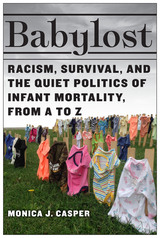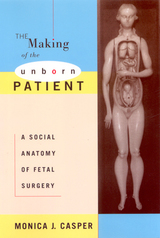2 books by Casper, Monica J.

Babylost
Racism, Survival, and the Quiet Politics of Infant Mortality, from A to Z
Monica J. Casper
Rutgers University Press, 2021
The U.S. infant mortality rate is among the highest in the industrialized world, and Black babies are far more likely than white babies to die in their first year of life. Maternal mortality rates are also very high. Though the infant mortality rate overall has improved over the past century with public health interventions, racial disparities have not. Racism, poverty, lack of access to health care, and other causes of death have been identified, but not yet adequately addressed. The tragedy is twofold: it is undoubtedly tragic that babies die in their first year of life, and it is both tragic and unacceptable that most of these deaths are preventable. Despite the urgency of the problem, there has been little public discussion of infant loss. The question this book takes up is not why babies die; we already have many answers to this question. It is, rather, who cares that babies, mostly but not only Black and Native American babies, are dying before their first birthdays? More importantly, what are we willing to do about it? This book tracks social and cultural dimensions of infant death through 58 alphabetical entries, from Absence to ZIP Code. It centers women’s loss and grief, while also drawing attention to dimensions of infant death not often examined. It is simultaneously a sociological study of infant death, an archive of loss and grief, and a clarion call for social change.
[more]

The Making of the Unborn Patient
A Social Anatomy of Fetal Surgery
Casper, Monica J
Rutgers University Press, 1998
Winner of the 1998 C. Wright Mills Award from the Society for the Study of Social Problems
It is now possible for physicians to recognize that a pregnant woman's fetus is facing life-threatening problems, perform surgery on the fetus, and if it survives, return it to the woman's uterus to finish gestation. Although fetal surgery has existed in various forms for three decades, it is only just beginning to capture the public's imagination. These still largely experimental procedures raise all types of medical, political and ethical questions. Who is the patient? What are the technical difficulties involved in fetal surgery? How do reproductive politics seep into the operating room, and how do medical definitions and meanings flow out of medicine and into other social spheres? How are ethical issues defined in this practice and who defines them? Is fetal surgery the kind of medicine we want? What is involved in reframing fetal surgery as a women's health issue, rather than simply a pediatric concern? In this ethnographic study of the social, cultural and historical aspects of fetal surgery, Monica Casper addresses these questions. The Making of the Unborn Patient examines two important and connected events of the second half of the 20th century: the emergence of fetal surgery as a new medical specialty and the debut of the unborn patient.
It is now possible for physicians to recognize that a pregnant woman's fetus is facing life-threatening problems, perform surgery on the fetus, and if it survives, return it to the woman's uterus to finish gestation. Although fetal surgery has existed in various forms for three decades, it is only just beginning to capture the public's imagination. These still largely experimental procedures raise all types of medical, political and ethical questions. Who is the patient? What are the technical difficulties involved in fetal surgery? How do reproductive politics seep into the operating room, and how do medical definitions and meanings flow out of medicine and into other social spheres? How are ethical issues defined in this practice and who defines them? Is fetal surgery the kind of medicine we want? What is involved in reframing fetal surgery as a women's health issue, rather than simply a pediatric concern? In this ethnographic study of the social, cultural and historical aspects of fetal surgery, Monica Casper addresses these questions. The Making of the Unborn Patient examines two important and connected events of the second half of the 20th century: the emergence of fetal surgery as a new medical specialty and the debut of the unborn patient.
[more]
READERS
Browse our collection.
PUBLISHERS
See BiblioVault's publisher services.
STUDENT SERVICES
Files for college accessibility offices.
UChicago Accessibility Resources
home | accessibility | search | about | contact us
BiblioVault ® 2001 - 2024
The University of Chicago Press









